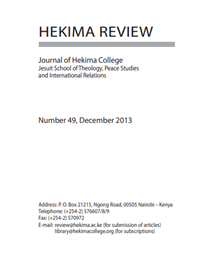Deborah and Jael: The Liberation of Politics and the Politics of Liberation
Keywords:
Liberation of Politics, Politics of LiberationAbstract
The Catholic Church finds itself as a union of a body of believers, resident within a nation having its own law-making organisation for governance, just as Israel found itself within Canaan in the time of the Judges. This setting poses several challenges to the lived faith concerning how the members of the Catholic Church should relate to: influences from the surrounding culture, the passing of non-Catholic laws in their nation, violations of religious liberty, the socio-economic wellbeing of Catholics, the political participation of Catholics in nation governance and especially, the evangelisation of the nation. It unavoidably raises questions of who, what, why,
how and to what extent. This paper delves into the historical account of Deborah’s governance, rich as it is in literary twists and turns to unearth directives for the Church’s engagement with politics. It finally couches its recommendations from the political philosophy of Cameroon’s Catholic statesman Bernard Fonlon.
Downloads
Downloads
Published
Issue
Section
License
Copyright (c) 2024 Hekima Review

This work is licensed under a Creative Commons Attribution-ShareAlike 4.0 International License.


